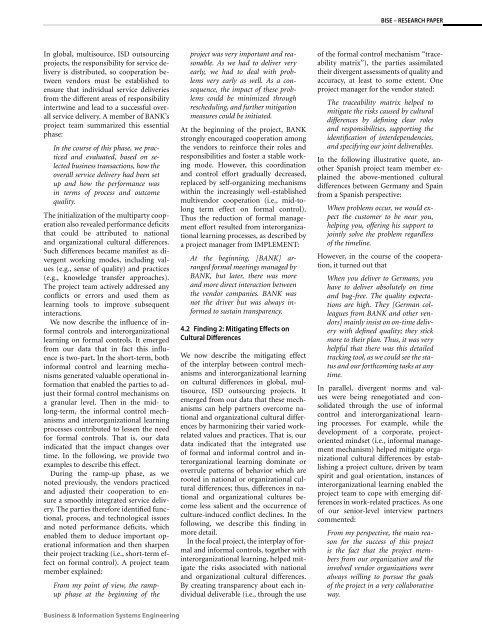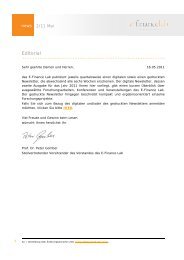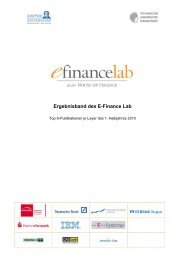Prof. Dr. Wolfgang König, Prof. Dr.-Ing. Ralf ... - E-Finance Lab
Prof. Dr. Wolfgang König, Prof. Dr.-Ing. Ralf ... - E-Finance Lab
Prof. Dr. Wolfgang König, Prof. Dr.-Ing. Ralf ... - E-Finance Lab
Create successful ePaper yourself
Turn your PDF publications into a flip-book with our unique Google optimized e-Paper software.
In global, multisource, ISD outsourcing<br />
projects, the responsibility for service delivery<br />
is distributed, so cooperation between<br />
vendors must be established to<br />
ensure that individual service deliveries<br />
from the different areas of responsibility<br />
intertwine and lead to a successful overall<br />
service delivery. A member of BANK’s<br />
project team summarized this essential<br />
phase:<br />
In the course of this phase, we practiced<br />
and evaluated, based on selected<br />
business transactions, how the<br />
overall service delivery had been set<br />
up and how the performance was<br />
in terms of process and outcome<br />
quality.<br />
The initialization of the multiparty cooperation<br />
also revealed performance deficits<br />
that could be attributed to national<br />
and organizational cultural differences.<br />
Such differences became manifest as divergent<br />
working modes, including values<br />
(e.g., sense of quality) and practices<br />
(e.g., knowledge transfer approaches).<br />
The project team actively addressed any<br />
conflicts or errors and used them as<br />
learning tools to improve subsequent<br />
interactions.<br />
We now describe the influence of informal<br />
controls and interorganizational<br />
learning on formal controls. It emerged<br />
from our data that in fact this influence<br />
is two-part. In the short-term, both<br />
informal control and learning mechanisms<br />
generated valuable operational information<br />
that enabled the parties to adjust<br />
their formal control mechanisms on<br />
a granular level. Then in the mid- to<br />
long-term, the informal control mechanisms<br />
and interorganizational learning<br />
processes contributed to lessen the need<br />
for formal controls. That is, our data<br />
indicated that the impact changes over<br />
time. In the following, we provide two<br />
examples to describe this effect.<br />
During the ramp-up phase, as we<br />
noted previously, the vendors practiced<br />
and adjusted their cooperation to ensure<br />
a smoothly integrated service delivery.<br />
The parties therefore identified functional,<br />
process, and technological issues<br />
and noted performance deficits, which<br />
enabled them to deduce important operational<br />
information and then sharpen<br />
their project tracking (i.e., short-term effect<br />
on formal control). A project team<br />
member explained:<br />
From my point of view, the rampup<br />
phase at the beginning of the<br />
Business & Information Systems Engineering<br />
project was very important and reasonable.<br />
As we had to deliver very<br />
early, we had to deal with problems<br />
very early as well. As a consequence,<br />
the impact of these problems<br />
could be minimized through<br />
rescheduling, and further mitigation<br />
measures could be initiated.<br />
At the beginning of the project, BANK<br />
strongly encouraged cooperation among<br />
the vendors to reinforce their roles and<br />
responsibilities and foster a stable working<br />
mode. However, this coordination<br />
and control effort gradually decreased,<br />
replaced by self-organizing mechanisms<br />
within the increasingly well-established<br />
multivendor cooperation (i.e., mid-tolong<br />
term effect on formal control).<br />
Thus the reduction of formal management<br />
effort resulted from interorganizational<br />
learning processes, as described by<br />
a project manager from IMPLEMENT:<br />
At the beginning, [BANK] arranged<br />
formal meetings managed by<br />
BANK, but later, there was more<br />
and more direct interaction between<br />
the vendor companies. BANK was<br />
not the driver but was always informed<br />
to sustain transparency.<br />
4.2 Finding 2: Mitigating Effects on<br />
Cultural Differences<br />
We now describe the mitigating effect<br />
of the interplay between control mechanisms<br />
and interorganizational learning<br />
on cultural differences in global, multisource,<br />
ISD outsourcing projects. It<br />
emerged from our data that these mechanisms<br />
can help partners overcome national<br />
and organizational cultural differences<br />
by harmonizing their varied workrelated<br />
values and practices. That is, our<br />
data indicated that the integrated use<br />
of formal and informal control and interorganizational<br />
learning dominate or<br />
overrule patterns of behavior which are<br />
rooted in national or organizational cultural<br />
differences; thus, differences in national<br />
and organizational cultures become<br />
less salient and the occurrence of<br />
culture-induced conflict declines. In the<br />
following, we describe this finding in<br />
more detail.<br />
In the focal project, the interplay of formal<br />
and informal controls, together with<br />
interorganizational learning, helped mitigate<br />
the risks associated with national<br />
and organizational cultural differences.<br />
By creating transparency about each individual<br />
deliverable (i.e., through the use<br />
BISE – RESEARCH PAPER<br />
of the formal control mechanism “traceability<br />
matrix”), the parties assimilated<br />
their divergent assessments of quality and<br />
accuracy, at least to some extent. One<br />
project manager for the vendor stated:<br />
The traceability matrix helped to<br />
mitigate the risks caused by cultural<br />
differences by defining clear roles<br />
and responsibilities, supporting the<br />
identification of interdependencies,<br />
and specifying our joint deliverables.<br />
In the following illustrative quote, another<br />
Spanish project team member explained<br />
the above-mentioned cultural<br />
differences between Germany and Spain<br />
from a Spanish perspective:<br />
When problems occur, we would expect<br />
the customer to be near you,<br />
helping you, offering his support to<br />
jointly solve the problem regardless<br />
of the timeline.<br />
However, in the course of the cooperation,<br />
it turned out that<br />
When you deliver to Germans, you<br />
have to deliver absolutely on time<br />
and bug-free. The quality expectations<br />
are high. They [German colleagues<br />
from BANK and other vendors]<br />
mainly insist on on-time delivery<br />
with defined quality; they stick<br />
more to their plan. Thus, it was very<br />
helpful that there was this detailed<br />
tracking tool, as we could see the status<br />
and our forthcoming tasks at any<br />
time.<br />
In parallel, divergent norms and values<br />
were being renegotiated and consolidated<br />
through the use of informal<br />
control and interorganizational learning<br />
processes. For example, while the<br />
development of a corporate, projectoriented<br />
mindset (i.e., informal management<br />
mechanism) helped mitigate organizational<br />
cultural differences by establishing<br />
a project culture, driven by team<br />
spirit and goal orientation, instances of<br />
interorganizational learning enabled the<br />
project team to cope with emerging differences<br />
in work-related practices. As one<br />
of our senior-level interview partners<br />
commented:<br />
From my perspective, the main reason<br />
for the success of this project<br />
is the fact that the project members<br />
from our organization and the<br />
involved vendor organizations were<br />
always willing to pursue the goals<br />
of the project in a very collaborative<br />
way.








